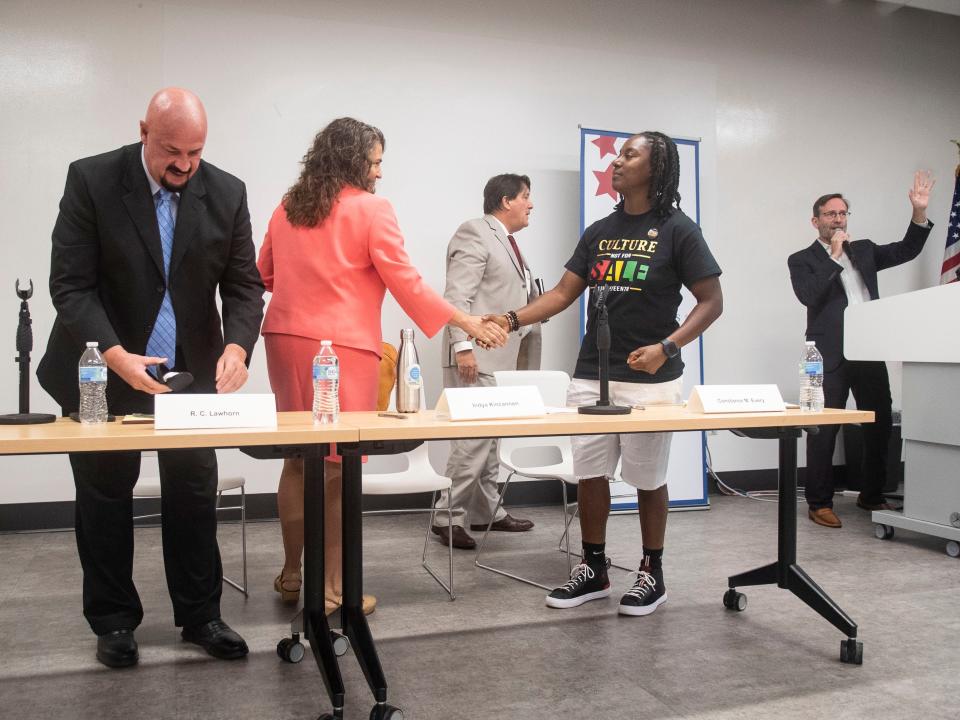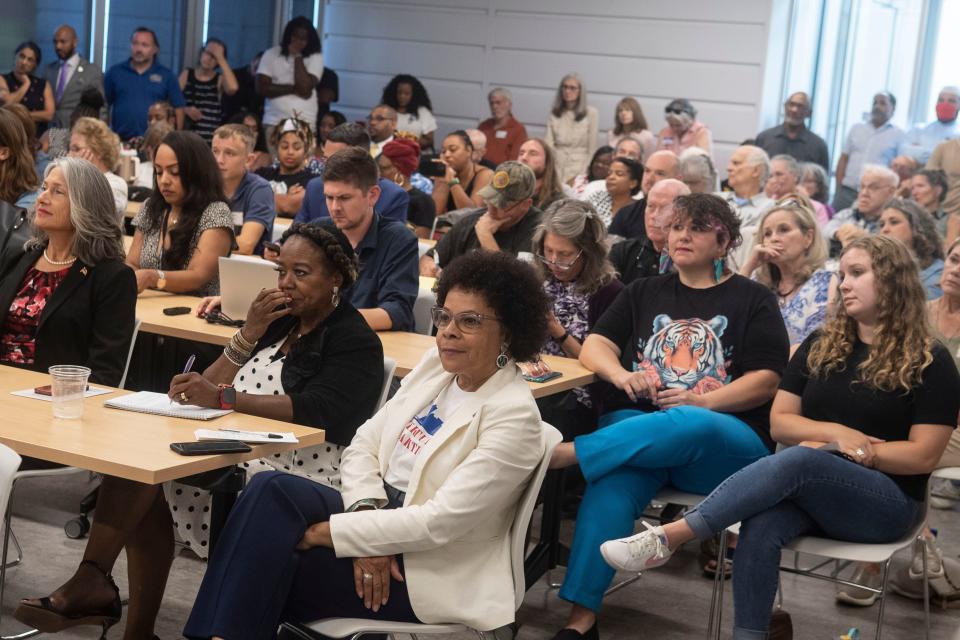Knoxville's housing is becoming unaffordable. What do the mayor candidates suggest?
- Oops!Something went wrong.Please try again later.
Against the backdrop of yet another national report highlighting Knoxville’s skyrocketing rental rates, the city’s mayoral candidates were peppered with questions about how they would begin to solve the problem.
At the same time rents are increasing, there aren't enough affordable homes for low-income families and early-career workers, so buying isn't a great option either.
Small business owner R.C. Lawhorn, banker Jeff Talman and activist Constance Every are challenging incumbent mayor Indya Kincannon. They spoke Aug. 1 at a League of Women Voters forum before early voting begins Aug. 9.
The candidates had limited time to respond to questions and therefore could only give tidbits of their plans to address complex issues such as the affordable housing crisis. But the night served as an opportunity for candidates to separate themselves from Kincannon's policies and, in return, for the mayor to stake her claim for another term.
Here is what we learned:
What the data shows
The Knoxville Metropolitan Statistical Area has the fifth-fastest rent growth in the country, according to a recently released report from the National Association of Realtors. In the second quarter of 2023 (April through June), Knoxville rent was up 6.25% from the same time in 2022. The U.S. average rent grew 1.1% during the same time.
But that could be a vast underreporting. East Tennessee Realtors reports rent in the Knoxville area rose 9.6% during that same time frame, compared to a 2.3% increase nationally.

The 9.6% increase equates to about $160 a month, bringing Knoxville's average rent to $1,439 across all size units, said East Tennessee Realtors governmental affairs and policy director Hancen Sale.
Those figures would mean Knoxville has seen the third-fastest rent growth in the country.
Possible solutions
More flexible land use
Lawhorn, a professional contractor, said Knoxville could benefit from a robust influx of zero lot line properties, which are properties with little to no side yard. These areas allow for much greater density and are popular in communities like Nashville that have seen immense growth. Talman suggested the city could partner with Clayton Homes and use the industry leader’s expertise in building affordable homes here.
Kincannon said the city has partnered with East Tennessee Realtors and will be implementing some of its recommendations by the end of the year, though she didn't get into specifics. She did say, however, the city has long been bound by zoning policies that encourage sprawl and that those policies should be revisited.
Every criticized the lack of affordable and workforce housing options, and particularly pointed to surplus properties owned by the city which, she said, could be used for affordable housing. She also said the city should implement community land trusts, which are setups where typically a nonprofit oversees the property to manage it affordably based on shared equity.
What about rent control?
Kincannon was quick to point out that while rents have skyrocketed, state law doesn’t allow the city to impose any form of rent control. Instead, the city would have to continue serving as a “funding gap” for projects. The city has set aside $50 million for affordable housing construction and Kincannon said every $1 the city spends equals $12 from the private sector.
The mayor also said the city has helped build 2,000 new homes for “the lowest income families” in Knoxville since taking office.
While state law hampers what can be done, Every said the city could push for innovative ways to require property owners make certain provisions or improvements on their properties if rents are raised.
About the race
Though Knoxville's mayoral race is nonpartisan, Democrats largely left Kincannon alone and Republicans did not make a major competitive push, still licking their wounds from getting swept in the city council elections in 2021.
This shows up in fundraising totals. Using leftover funds from her 2019 election, plus strong recent fundraising, Kincannon has over $150,000 on hand after the most recent reporting period. The next-closest competitor, Jeff Talman, has only $9,500.

The city’s election system allows for a candidate to be named the winner after the primary election if he or she receives 50% of votes cast plus one. Meaning if Kincannon crosses that threshold, she will win and serve her second term, which would be her final one because of term limits. If no candidate reaches the threshold, the top two vote-getters head to a runoff on Nov. 7.
The city’s last two elected mayors (not counting appointed Mayor Daniel Brown) have each won election during the primary stage (Bill Haslam twice, 2003 and 2007, and Madeline Rogero once in 2015).
During her first election in 2019, Kincannon came in second to Eddie Mannis in the primary that had six candidates but she turned around and topped Mannis in the general election.
Important election dates to know
Aug. 9: First day of early voting
Aug. 22: Final day to request an absentee ballot
Aug. 24: Final day of early voting
Aug. 29: Primary Election Day. You must vote in person at your polling site.
Tyler Whetstone is an investigative reporter focused on accountability journalism. Email tyler.whetstone@knoxnews.com. Twitter @tyler_whetstone.
Support strong local journalism by subscribing at knoxnews.com/subscribe.
This article originally appeared on Knoxville News Sentinel: Knoxville mayor candidates suggest housing affordability fixes

